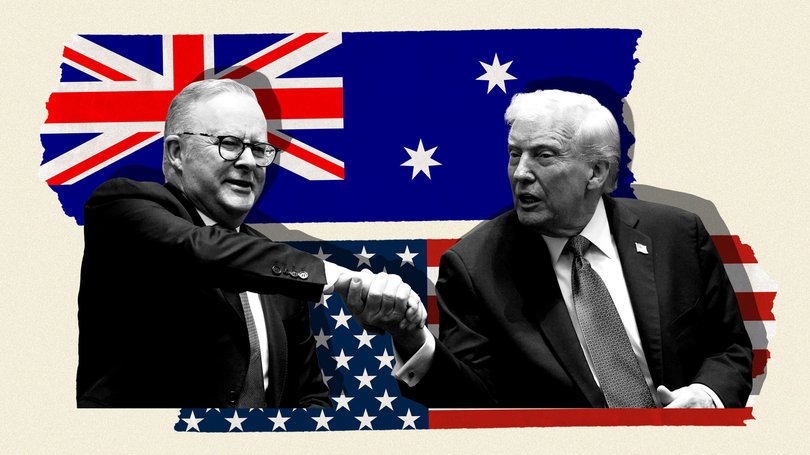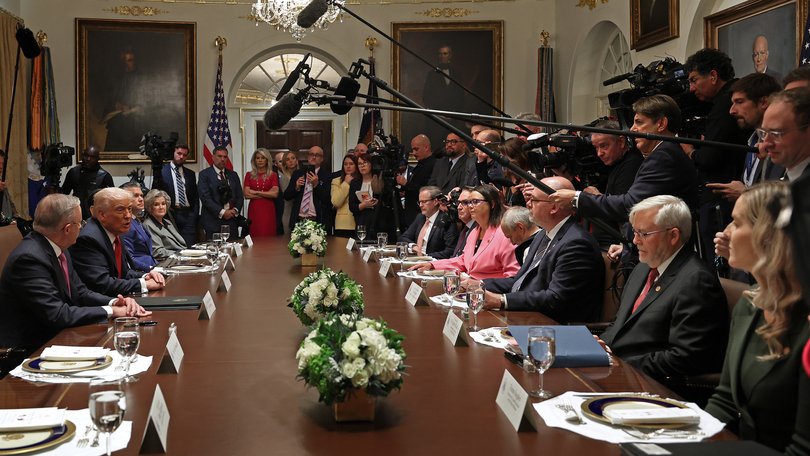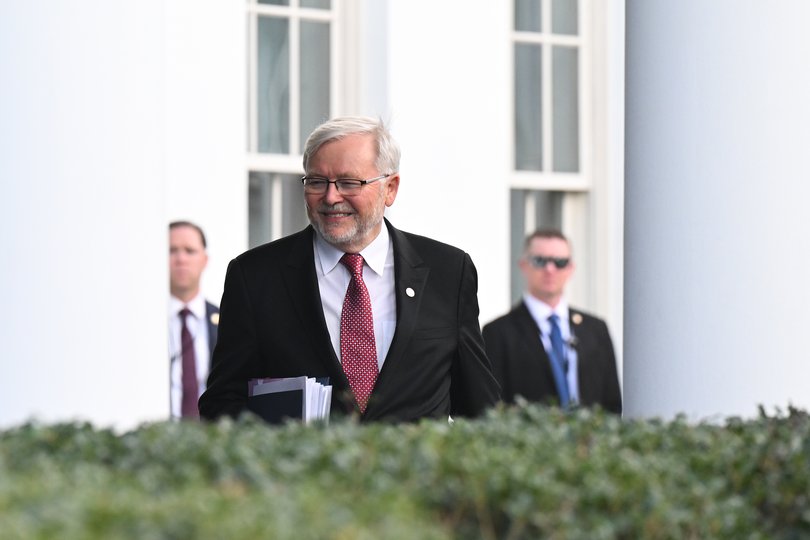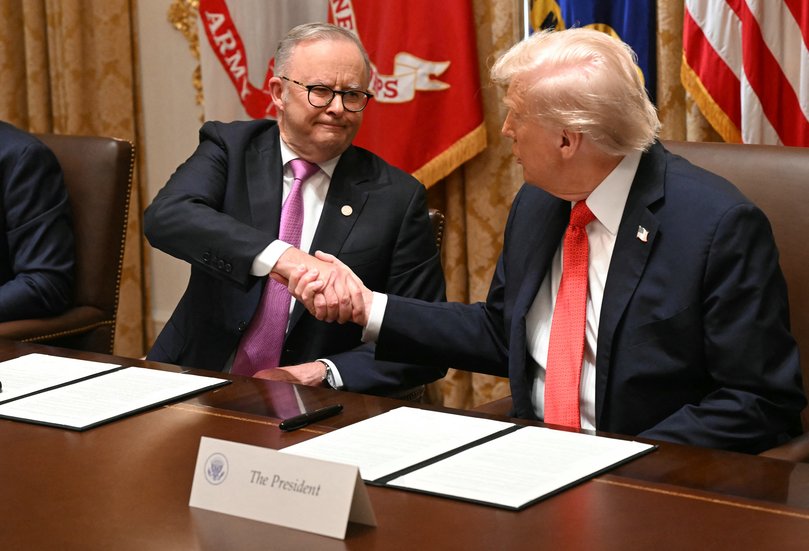LATIKA M BOURKE: How Trump’s graciousness and Albanese’s diplomacy cemented unshakeable US-Australia alliance
LATIKA M BOURKE: It was surely a disappointing day for those who have exploited the US President’s style in a campaign to cool the alliance.

The Trump and Albanese get-together was more than a successful first meeting between the Allied leaders – it represented a turning point in the alliance and marked a promising start to a new coordinated way of countering China.
That the critical minerals deal, which binds the US and Australia together economically in creating a turbocharged alternative supply chain to rival China’s, has been forged by two governments that are on paper so dissonant, is its strength.
Monday was surely a disappointing day for those in Labor’s ranks who have exploited the US President’s destructive, coercive and vindictive style to reiterate their plea for a break or cooling in the alliance.
Sign up to The Nightly's newsletters.
Get the first look at the digital newspaper, curated daily stories and breaking headlines delivered to your inbox.
By continuing you agree to our Terms and Privacy Policy.Mr Trump’s trade tariffs, which Australia does not deserve, and Elbridge Colby’s snap and shock America First Pentagon review into AUKUS caused much alarm.
That Donald Trump full-throatedly embraced not just the new minerals deal, but the alliance, AUKUS and Mr Albanese himself, it is now clear that the US-Australia relationship is truly unshakeable.
This is to be welcomed. But it was not inevitable.
Anthony Albanese’s weakness as Prime Minister has always been his disinterest in foreign affairs, defence and national security.
But this week, his often unnoticed strengths — delegating and personal relationships — delivered him his biggest foreign policy victory since first taking office and, in doing so, cemented his desire for a multi-term tenure in The Lodge.
This was never going to be an ordinary visit between an Australian leader and a US President.
Such was Mr Trump’s volatility that no one knew for sure if the meeting would go well until the Prime Minister and the President were left alone.
After the infamous Oval Office showdown with Ukraine’s President Volodymyr Zelenskyy, world leaders have held their breath, fearing they could be next in line for such a berating.
But this was always unlikely. Mr Trump is actually a gracious host who, despite submitting fellow leaders who are far more media shy to the world’s press for marathon media conferences, goes out of his way to welcome guests to his home.
But as journalists were lining up in the White House grounds to enter the building via the Press Briefing room, the word was given that there would be no Oval Office encounter.
Instead, the meeting would be held in the Cabinet Room. This was said to be an honour, as the President has not sat beside another world leader at the Cabinet table before.

A visibly nervous Mr Albanese stepped out of his car and was greeted by a waiting Mr Trump, who turned to the cameras and said that his message for Australia was: “We love them.”
Inside the White House, he was immediately introduced to Secretary of State Marco Rubio and the new Navy Secretary John Phelan.
The discussion quickly turned to submarines, a personal passion of Mr Trump’s, who wants to restore American shipbuilding, another critical sector where the United States has fallen behind superpower rival China. It was no coincidence that Australia’s gift to Mr Trump was a model submarine.
Mr Trump and Mr Albanese were then left to their own devices for around twenty minutes. The President gave the Prime Minister a tour of the grounds, the Oval Office and the controversial works he is carrying out on the White House’s historic East Wing, which is being torn down and replaced with a giant ballroom.
Mr Albanese would later praise those works to the press as a “fantastic facility”.
He took this opportunity to inform Mr Trump about the construction of Parliament House in Canberra.
Once in the Cabinet room, Mr Trump welcomed the press, asking if an Australian cameraman positioned to his side had a good enough angle and wanted to come into the middle of the room.
It quickly became obvious that whatever Mr Albanese and Mr Trump discussed in those minutes alone had done the trick. Mr Trump patted Mr Albanese and called him a friend. The Prime Minister grinned, and the smile barely left his face throughout the course of the next forty minutes as the President directed his press conference.
This was the part that only Mr Albanese could get right, and he did. The President values highly personal relationships and likes strong winners. Mr Albanese, with 94 seats under his belt, is behaving like a winner — just observe the Joy Division T-shirt he wore to disembark his prime ministerial jet upon returning after his foreign policy triumph.
But his undisputed strength as Prime Minister, his ability to small-talk with anyone from any walk of life, was essential to the success of Monday’s meeting. This was his task to master alone, and he did.
Mr Albanese’s second great skill, which delivered for him in spades this week, is to delegate.

His decision to install Kevin Rudd as Australia’s Ambassador to the United States, past mean tweets aside, has paid off handsomely.
As a former prime minister, Mr Rudd lends authority to the job. As a China scholar, he brings intellectual heft. And as an indefatigable networker, he has forged key relationships on the Hill and across the Administration.
Kevin Rudd was a divisive figure inside his own party when prime minister, but on the polarised Capitol Hill, he is one of the few figures who enjoys bipartisan support.
Republican Senator and Chair of the Foreign Affairs committee, Michael McCaul, who authored the AUKUS legislation, said Rudd was there every step of the way.
Democrat Joe Courtney lavished Mr Rudd with similar praise at a Friends of Australia caucus attended by more than a dozen Members of Congress.
Mr Rudd’s relentless advocacy of AUKUS, including shoring up Congressional support across both sides, helped nix any designs AUKUS sceptic Elbridge Colby might have had on torpedoing the deal to sell Australia submarines.
When the American press reported that Marco Rubio told Republican Senators that “Bridge just likes to review things,” Australian officials began to exhale.
AUKUS was safe.
Mr Rudd applied this same doggedness to pursuing the critical minerals agreement.

Whilst Australians may deplore Donald Trump, enabling Labor to successfully exploit an anti-Trumpian sentiment during the election campaign to win Mr Albanese his 94 seats, the great irony is that Mr Trump signed onto something Biden wouldn’t.
The offer of jointly financing critical minerals projects was made to the Biden Administration, but they did nothing for 18 months.
It was signature “Sleepy Joe,” as the President would say.
Mr Trump corrected Biden’s inertia with a deal that aims to unlock a $13 billion pipeline of critical minerals with an initial $1.5 billion injection from each side.
The deal is a policy trifecta triumph. It shores up Australia’s alliance, supports local, well-paying jobs and in doing so counters China with an ideological agnosticism that makes it easy for China doves and hawks to support.
Zoltan Feher from the Washington-based Atlantic Council think tank told The Nightly the deal was a vital first step.
“The tone of the White House meeting between the US President and the Australian Prime Minister was very promising, very friendly,” he said in an interview in Washington DC.
“The US needs to have the closest possible coordination with its allies all around the world, especially in the Indo-Pacific and in terms of critical minerals.
“It’s obviously the first step of many that are necessary.”
It is now imperative that both governments make good to start their critical minerals commitments in time to beat China, as is the Australian government’s stated goal.
But Mr Albanese can be sure that he has locked up the US alliance and in doing so his quest to serve as a Labor equivalent of John Howard.
But next trip, he would be well advised to let his supporters to champion his successes and leave the self-congratulatory T-shirts at home.

